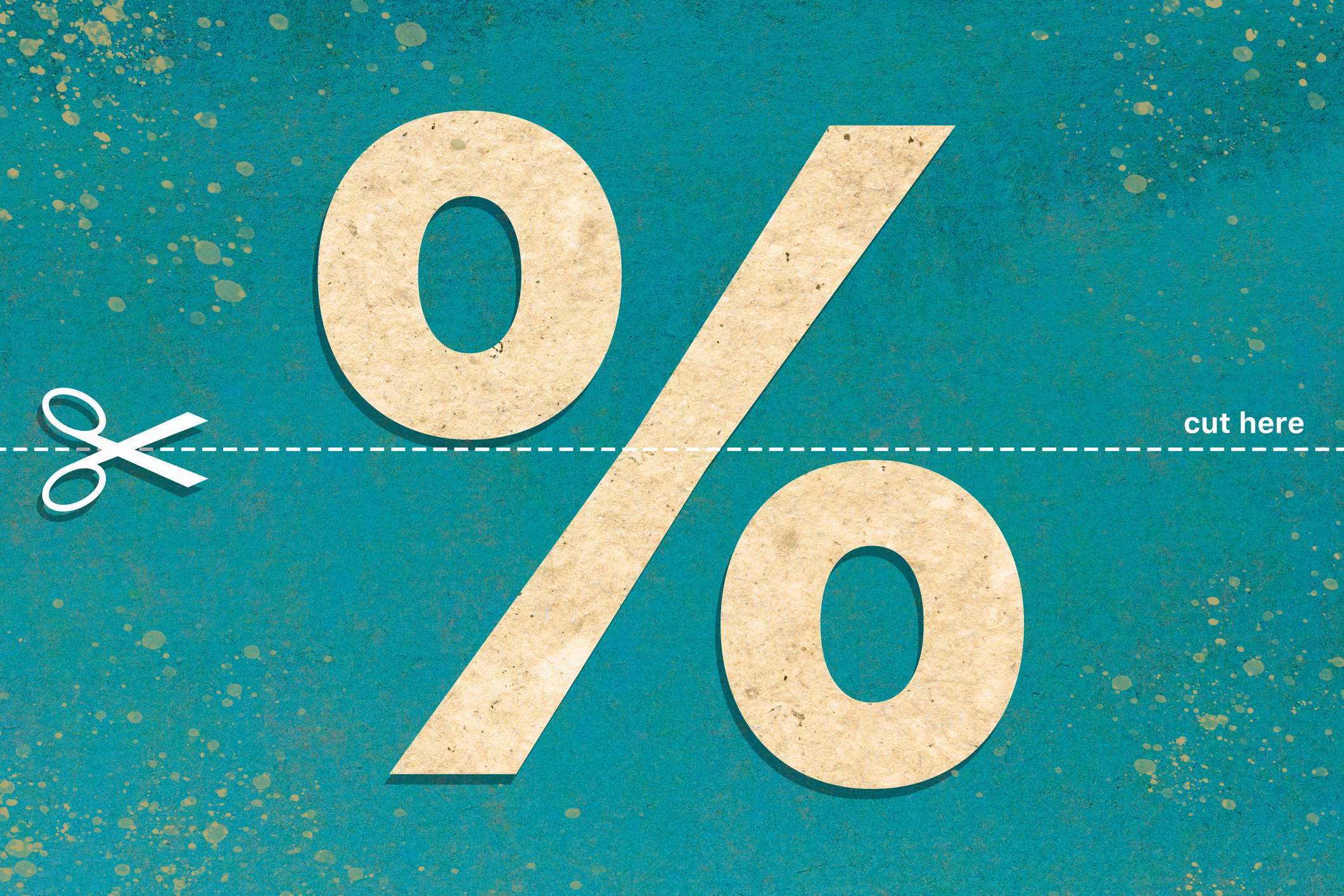Why I Think You Should Buy Stocks to Cope with Inflation
What's the best way to protect your investments when inflation rises and the value of the dollar falls? Surprisingly, the answer may lie in buying stocks.


Profit and prosper with the best of Kiplinger's advice on investing, taxes, retirement, personal finance and much more. Delivered daily. Enter your email in the box and click Sign Me Up.
You are now subscribed
Your newsletter sign-up was successful
Want to add more newsletters?
When it comes to inflation, the U.S. has been living in a fool’s paradise. Inflation — that is, the rise in the general level of prices — has been a fact of economic life, averaging 3.3% annually since 1914. But from 2009 to 2020, the consumer price index rose just 2.1% a year. We got used to inflation one-third lower than the historical norm, which is why post-COVID prices have been such a shock.
The best way to drive inflation out of the system is to hike short-term interest rates. Rates had been sitting close to zero from 2009 to 2022, with the exception of a brief period around 2018. Then the Federal Reserve started to increase rates relentlessly — to more than 5% in just two and a half years. The antidote worked, up to a point. Inflation dropped from 8% in 2022 to 4.1% in 2023 and to 2.9% last year. But the Fed’s target is 2%, and it’s having a tough time getting there.
“American inflation looks increasingly worrying,” said a headline in The Economist in February. President Trump was elected, in part, to stop prices from rising so much, and he has been trying. With Elon Musk, he has cut government employment and programs, but prices don’t react quickly to fiscal changes unless they’re so extreme as to cause a recession — an almost certain way to end inflation with a cure as bad as the disease. The president also wants to drive down energy costs by increasing domestic oil drilling, but oil prices are determined by global forces.
From just $107.88 $24.99 for Kiplinger Personal Finance
Become a smarter, better informed investor. Subscribe from just $107.88 $24.99, plus get up to 4 Special Issues

Sign up for Kiplinger’s Free Newsletters
Profit and prosper with the best of expert advice on investing, taxes, retirement, personal finance and more - straight to your e-mail.
Profit and prosper with the best of expert advice - straight to your e-mail.
Consumers are concerned, and if they start to think that inflation is rising, they will drive up prices by buying goods ahead of further anticipated increases. The most recent University of Michigan Survey of Consumers found that expectations for inflation over the next year jumped from 3.3% in the previous month’s survey to 4.3% — the highest reading since November 2023 and the second consecutive month of unusually large increases. A big reason is the threat of higher tariffs, which would raise the cost of goods that Americans buy — not just imported goods, but U.S.-made products as well.
Stocks to buy when inflation is rising
So, the fool’s paradise may be ending. Inflation of 3% may not sound like much, but it means that the dollar loses half its value in 24 years; at 4%, it happens in just 18 years. In such a scary environment, is there a way to protect your investments?
The surprise answer is to buy stocks. Consider the worst period of inflation in U.S. history, 1977–81, when the CPI rose at an annualized average rate of 10%. The S&P 500 stock index returned an annualized 8% — a bit below the norm but much higher than returns on long-term U.S. Treasuries, which fell by an average of 1% a year, including interest payments and price declines.
The reason stocks do better is that businesses can counter their own higher costs by raising prices. With inflation averaging about 5% between 2022 and 2024 and the Fed aggressively boosting interest rates, the S&P 500 has produced an annualized return of about 9%.
In an article I wrote in this magazine 19 years ago, with inflation rising, I recommended stocks of companies that appeared to have the power to raise their prices without much resistance. One example was Coca-Cola (KO, $71), which has risen from its price back then of $22 a share while paying a dividend that has jumped by two-thirds (the yield is now 2.9%). I still like Coke; no one can make Coke but Coke. (Securities I like are in bold; prices are as of February 28.)
Other stocks in this category are technology businesses that sell distinctive services by subscription — charging small amounts each month for cloud storage, for example. Apple (AAPL, $242) and Alphabet (GOOGL, $170) are excellent choices.
A non-tech stock that raises prices with impunity is Public Storage (PSA, $304), a real estate investment trust that provides a more mundane kind of storage — for cartons and furniture you don’t want to keep at home. Once you have stored your earthly possessions with Public Storage, moving them to escape a 5% price increase is annoying and onerous. The stock has returned an annualized 11.7% for the past five years.
Another category for inflationary times includes stocks that earn a fairly consistent proportion of a growing pie. Unfortunately, these franchise companies — such as advertising agencies, insurance firms, realtors and ticket sellers — are undergoing upheavals now. Still, there are stocks I like. One is Live Nation Entertainment (LYV, $143), the giant concert producer. Another is Chubb (CB, $285), an insurance company specializing in high-income clients.
How to invest in commodities
Prices of commodities typically rise in inflationary times, but buying leveraged futures contracts comes with severe risks: Transaction fees are high, and a sharp dip can wipe out all of your capital. Also, I have a bias against putting money into things (lumber, pork bellies, gold) rather than people and ideas.
Instead, invest in commodities through natural-resource funds that let you take advantage of human ingenuity as well as the prices of goods rising with inflation. An attractive choice is Vanguard Materials (VAW, $197), with an expense ratio of just 0.09%. The exchange-traded fund’s portfolio is headed by Linde (LIN, $467), a U.K.-based company that sells industrial gases, such as nitrogen and helium, and has a market capitalization (price times shares outstanding) of $221 billion. The stock has doubled in less than five years.
Also consider iShares North American Natural Resources (IGE, $44), an ETF whose portfolio leans heavily toward oil and gas stocks, such as EOG Resources (EOG, $127), but also owns such intriguing companies as CRH (CRH, $103), an Ireland-based producer of building materials such as granite and sandstone.
What about Treasury inflation-protected securities?
What about TIPS, or Treasury inflation-protected securities, which pay a guaranteed real rate of interest plus an inflation kicker that rises with monthly changes in the CPI? At an auction in February, 30-year TIPS were sold carrying a real rate of about 2.4%, the highest since 2001. If inflation averages 3% until maturity, your annual return will exceed 5%.
But TIPS markets are remarkably volatile. In a time of above-average inflation, I would stay away from bonds and bond funds — except those with very short-term holdings. The problem is that when interest rates rise with inflation, the bonds you bought at a lower fixed rate lose their value.
Better to stick with stocks, even though you’ll have to be content with lower returns than in times of stable prices. In fact, one of the best ways to ride out inflation is simply by owning a representative chunk of the market through SPDR Dow Jones Industrial Average (DIA, $438), an ETF known as Diamonds. Many of the Dow’s 30 components are built for inflationary times, among them Nike (NKE, $79) and insurance giant Travelers (TRV, $258). Also, the Dow leans more toward value-oriented stocks, which do better during inflation, than toward growth-focused issues.
Inflation will never be an investor’s friend, but it doesn’t have to be an enemy either. Keep cool and carry a diversified portfolio.
James K. Glassman chairs Glassman Advisory, a public-affairs consulting firm. He does not write about his clients. His most recent book is Safety Net: The Strategy for De-Risking Your Investments in a Time of Turbulence. He owns none of the securities mentioned here. You can contact him at JKGlassman@gmail.com.
Note: This item first appeared in Kiplinger Personal Finance Magazine, a monthly, trustworthy source of advice and guidance. Subscribe to help you make more money and keep more of the money you make here.
Related content
Profit and prosper with the best of Kiplinger's advice on investing, taxes, retirement, personal finance and much more. Delivered daily. Enter your email in the box and click Sign Me Up.

-
 QUIZ: Are You Ready To Retire At 55?
QUIZ: Are You Ready To Retire At 55?Quiz Are you in a good position to retire at 55? Find out with this quick quiz.
-
 10 Decluttering Books That Can Help You Downsize Without Regret
10 Decluttering Books That Can Help You Downsize Without RegretFrom managing a lifetime of belongings to navigating family dynamics, these expert-backed books offer practical guidance for anyone preparing to downsize.
-
 New Ways to Keep Online Accounts Safe
New Ways to Keep Online Accounts SafeAs cybercrime evolves, the strategies you use to protect yourself need to evolve, too.
-
 The Merger Market is Heating Up. Here's How to Cash In
The Merger Market is Heating Up. Here's How to Cash InInvesting in takeover deals can be a low-volatility way to diversify your portfolio.
-
 Vanguard Cuts Fund Fees Again. Here's Why That's Important for You
Vanguard Cuts Fund Fees Again. Here's Why That's Important for YouVanguard recently cut fees on dozens of ETFs and mutual funds, which is great news for investors. Here's why.
-
 Ask the Editor, February 27: Questions on Tax Returns and Decedents
Ask the Editor, February 27: Questions on Tax Returns and DecedentsAsk the Editor In this week's Ask the Editor Q&A, Joy Taylor answers questions on how to file a tax return when someone has died and resources you can use to find more help.
-
 Will Your Children's Inheritance Set Them Free or Tie Them Up?
Will Your Children's Inheritance Set Them Free or Tie Them Up?An inheritance can mean extraordinary freedom for your loved ones, but could also cause more harm than good. How can you ensure your family gets it right?
-
 I'm a Financial Adviser: This Is the Real Key to Enjoying Retirement With Confidence
I'm a Financial Adviser: This Is the Real Key to Enjoying Retirement With ConfidenceA resilient retirement plan is a flexible framework that addresses income, health care, taxes and investments. And that means you should review it regularly.
-
 Life Loves to Throw Curveballs, So Ditch the Rigid Money Rules and Do This Instead
Life Loves to Throw Curveballs, So Ditch the Rigid Money Rules and Do This InsteadSome rules are too rigid for real life. A values-based philosophy is a more flexible approach that helps you retain confidence — whatever life throws at you.
-
 Big Nvidia Numbers Take Down the Nasdaq: Stock Market Today
Big Nvidia Numbers Take Down the Nasdaq: Stock Market TodayMarkets are struggling to make sense of what the AI revolution means across sectors and industries, and up and down the market-cap scale.
-
 Trump's New Retirement Plan: What You Need to Know
Trump's New Retirement Plan: What You Need to KnowPresident Trump's State of the Union address touched upon several topics, including a new retirement plan for Americans. Here's how it might work.